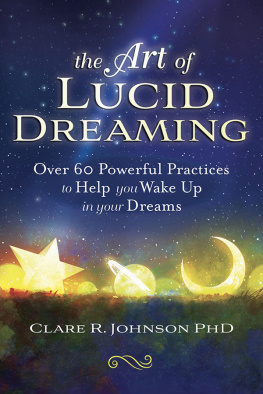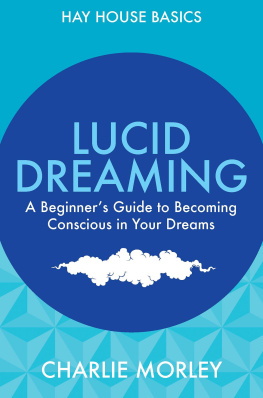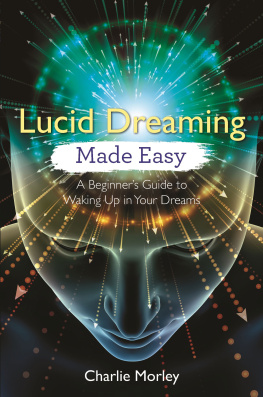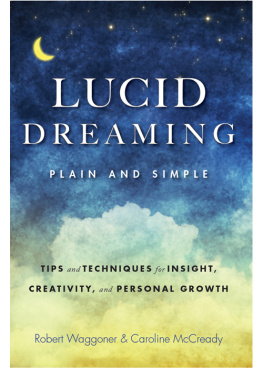Lucid Dreaming
Beginners Guide to Self-Awareness in Your Dreams
Copyright 2020 -Creek Ridge Publishing All rights reserved.
The contents of this book may not be reproduced, duplicated or transmitted without direct written permission from the author.
Under no circumstances will any legal responsibility or blame be held against the publisher for any reparation, damages, or monetary loss due to the information herein, either directly or indirectly.
Legal Notice:
This book is copyright protected. This is only for personal use. You cannot amend, distribute, sell, use, quote or paraphrase any part or the content within this book without the consent of the author.
Disclaimer Notice:
Please note the information contained within this document is for educational and entertainment purposes only. Every attempt has been made to provide accurate, up to date and reliable complete information. No warranties of any kind are expressed or implied. Readers acknowledge that the author is not engaging in the rendering of legal, financial, medical or professional advice. The content of this book has been derived from various sources. Please consult a licensed professional before attempting any techniques outlined in this book.
By reading this document, the reader agrees that under no circumstances is the author responsible for any losses, direct or indirect, which are incurred as a result of the use of information contained within this document, including, but not limited to, errors, omissions, or inaccuracies.
Table of Contents
L ucid dreaming has occupied an important place in human society since ancient times. It is a mysterious, confusing, but highly rewarding phenomenon that is often used to have random fun. It can also be used for other, more serious purposes such as conquering fears, getting rid of unnecessary emotions, achieving mental peace, and improving your psychological health. Nowadays, more and more therapists are using this method to address psychological issues.
Lucid dreaming is engulfed with many questions that make it a confusing concept. For the benefit of the reader, this book provides solutions to these questions in simple, efficient, and 'lucid' language. This book will teach you about lucid dreaming, tips and tricks, and how to stay safe.
Chapter 1: Basics of Dreams
L ucid dreaming has achieved rapid popularity over the world, especially in developed nations. People find it fascinating, confusing, and in some cases, scary. Before moving on to lucid dreaming, it is necessary to look at what dreaming is and how it is connected to lucid dreaming.
D reaming is one of the most interesting and confusing phenomena associated with sleep. Dreams can be varied, they can be disturbing, they can be entertaining, or they can be absolutely bizarre. Everyone dreams, but only a few of us can recall the dreams the next day. A question that still remains unanswered is why do we dream? Another question that remains unanswered is, what do dreams mean?
What Are Dreams?
Dreams can be called as images or stories that our brain concocts while we are asleep. These stories can be basic or can be extremely vivid. They often induce emotions and can make you sad, happy, or scared. Sometimes the dream can be quite rational, but most of the time, they are confusing and bizarre.
Dreams are not bound by any particular phase of the sleep and can occur almost anytime; however, the most vivid dreams are experienced during the 'Rapid Eye Movement' or REM sleep. This is the phase of sleep in which the brain is the most active. Experts believe that a person dreams at least 4-6 times in a night.
Nightmares
Nightmares are the most well-known dreams. Any dream that is considered to be bad is a nightmare. It is observed in adults as well as children. It generally happens due to:
Trauma
Conflict
Fear
Stress
Medication
Drugs
Emotional Issues
Illness
Others
A person may have a specific nightmare over and over. If this is the case, then the person's subconscious is perhaps trying to send them a message. The nightmare will only go away when the situation is resolved, or the person addresses the situation. If you have nightmares all the time without any reason, it is recommended to contact a mental health professional. A professional may help you figure out the underlying cause behind the nightmares.
Generally, whatever happens in a nightmare is not real and will not happen in real life (exceptions exist).
W hile we know that everyone dreams, we still don't know why we dream. There is a multitude of theories that try to explain the reason behind dreaming, but none of them are conclusive. Some researchers believe that dreaming has no meaning or purpose, while others believe that dreams are essential to maintain our emotional, mental, and physical health.
Many studies have been conducted to understand the importance of dreams and their effects on our health. In one study, the participants were woken up right before they entered the REM sleep stage. It was found that the subjects who were stopped from having dreams suffered from:
More anxiety
Excessive tension
Focus and concentration problems
Depression
Weight gain
Lack of coordination
Hallucinations
Most experts around the world believe that dreams are meant to solve our problems and help us process emotions. They are also supposed to help you incorporate memories. This is why the concept of 'sleeping on something' exists. If you go to bed with a problem, you may wake up with a solution or at least feel better about the whole ordeal.
Next page
















